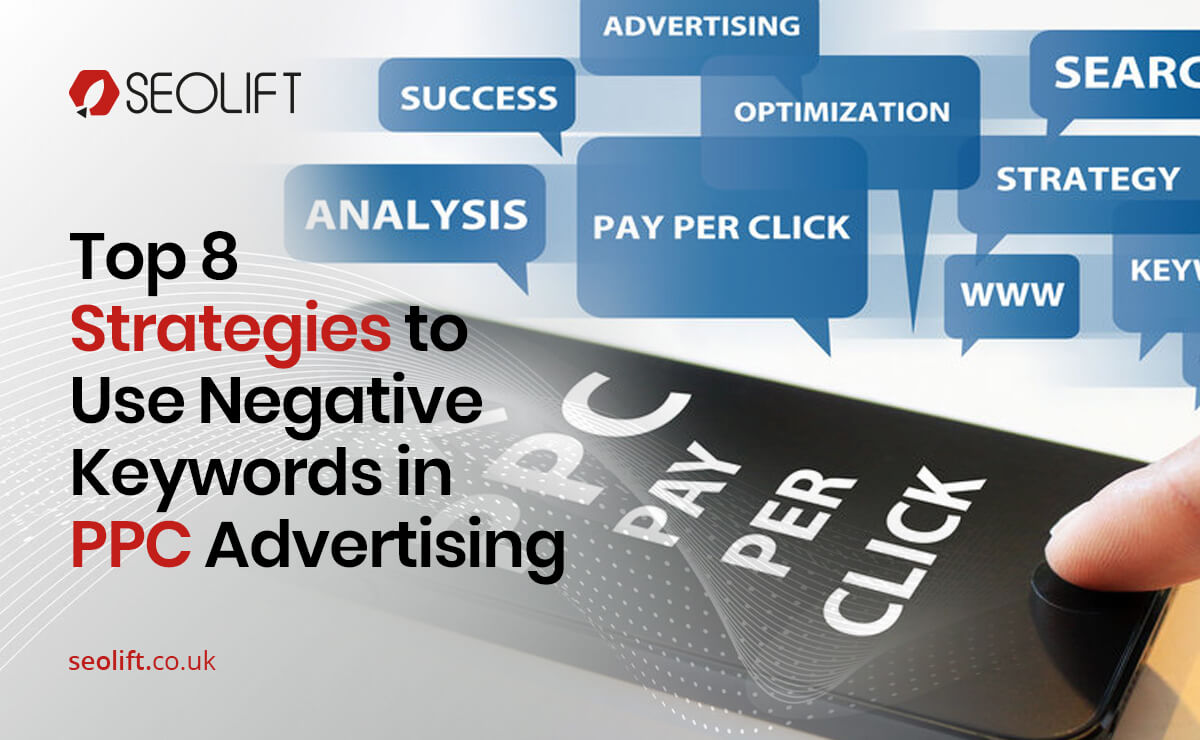
Pay-per-click (PPC) advertising is a productive way to drive targeted traffic to your website. It’s not just about picking the right keywords to target; it’s also about using negative keywords strategically.
Negative keywords are gatekeepers for your advertising campaigns, ensuring your ads are shown to the most relevant audience. This comprehensive guide will look at the top eight strategies for effectively using negative keywords in your PPC advertising campaigns.
According to a PPC agency London, before delving into strategies, it is critical to understand the concept of negative keywords. Negative keywords are gatekeepers for your PPC campaigns, ensuring your ads are shown to the most relevant audience. You specify These terms or phrases to prevent your ads from being displayed when those keywords appear in a user’s search query.
For example, if your company sells high-end luxury watches, you might include “cheap” as a negative keyword to exclude users looking for more affordable options. Understanding how negative keywords work is essential for using them effectively in your PPC advertising strategy.
Extensive keyword research is essential for success. It is, however, equally important to devote time to research and identify negative keywords. Tools like Google’s Keyword Planner can assist you in identifying potential negative keywords that will help you filter out irrelevant traffic.
By conducting extensive research for positive and negative keywords, you ensure that your advertising budget is spent wisely and that your ads reach the most likely convert audience.
The routine review of search query reports within your PPC platform is essential for optimising your PPC campaigns. These reports provide helpful information by displaying the search terms that triggered your ads.
This data lets you identify irrelevant or unrelated terms that may drain your budget without producing meaningful results. By placing these terms and adding them as negative keywords as soon as possible, you can keep a tight grip on the relevance of your ad audience, improving the overall performance of your campaigns.
Using broad and exact match types is best when incorporating negative keywords into your PPC campaigns. General match negatives can exclude variations and related terms, resulting in a more thorough filtration of unwanted traffic.
On the other hand, exact match negatives allow you to precisely target specific phrases, giving you fine-grained control over ad delivery. Using a combination of both match types will let you strike the right balance between broad audience exclusion and precise targeting, optimising the performance of your campaign.
Effective campaign segmentation is a powerful tool in the PPC advertiser’s arsenal. You can tailor your negative keyword strategy to each unique segment by segmenting your campaigns based on product categories, geographic locations, or demographics.
This means that each segment can have its negative keywords, ensuring that your ads are only shown to those most relevant to that segment. Segmentation improves the precision of your ad targeting and increases the likelihood of conversions.
Keyword match types are equally important when dealing with negative keywords as they are when dealing with positive keywords. Using different match types for your negative keywords—broad, phrase, and exact—gives you varying degrees of control over the exclusion process. Broad match negatives cast a wide net, excluding related and variant terms.
Excluding specific phrases with phrase match negatives provides intermediate control, whereas exact match negatives provide pinpoint accuracy by excluding only the exact terms specified. Using match types strategically is a powerful technique for fine-tuning your PPC campaigns.
The PPC landscape is ever-changing, and user behaviour changes over time. As a result, it is critical to take a proactive approach by routinely monitoring the performance of your campaigns. Reviewing metrics like click-through rates, conversion rates, and cost per conversion regularly can reveal shifting trends and emerging patterns.
Make any necessary changes to your negative keyword list based on these findings. You ensure that your PPC campaigns remain finely tuned for optimal performance by remaining vigilant and adapting to changing circumstances.
Looking at your competitors can provide valuable insights into the competitive world of PPC advertising. Examine your competitors’ ad campaigns and the search terms that trigger their ads. You can redirect your competitors’ traffic to your site by identifying keywords related to them and adding them as negative keywords in your ad campaigns.
This strategy protects your advertising budget from being spent on competitor-related queries and positions your company to capture the attention of users actively looking for alternatives to your competitors.
In the world of PPC advertising, where every click costs money, using negative keywords strategically is a game changer. You can greatly enhance the proficiency and effectiveness of your PPC campaigns by implementing the top eight strategies outlined in this guide. Remember that negative keywords are not a one-time setup; they must be optimised and fine-tuned on an ongoing basis to ensure that your ads reach the right audience and maximise your return on investment. Watch for changing trends and watch your PPC campaigns soar to new heights.
We offer the best-in-class Digital Marketing solutions to cater your brand and business needs. At Seolift, we have a team of experts who provide you with top notch digital marketing services. Our premium services include SEO, PPC, SMM and Content Marketing.
